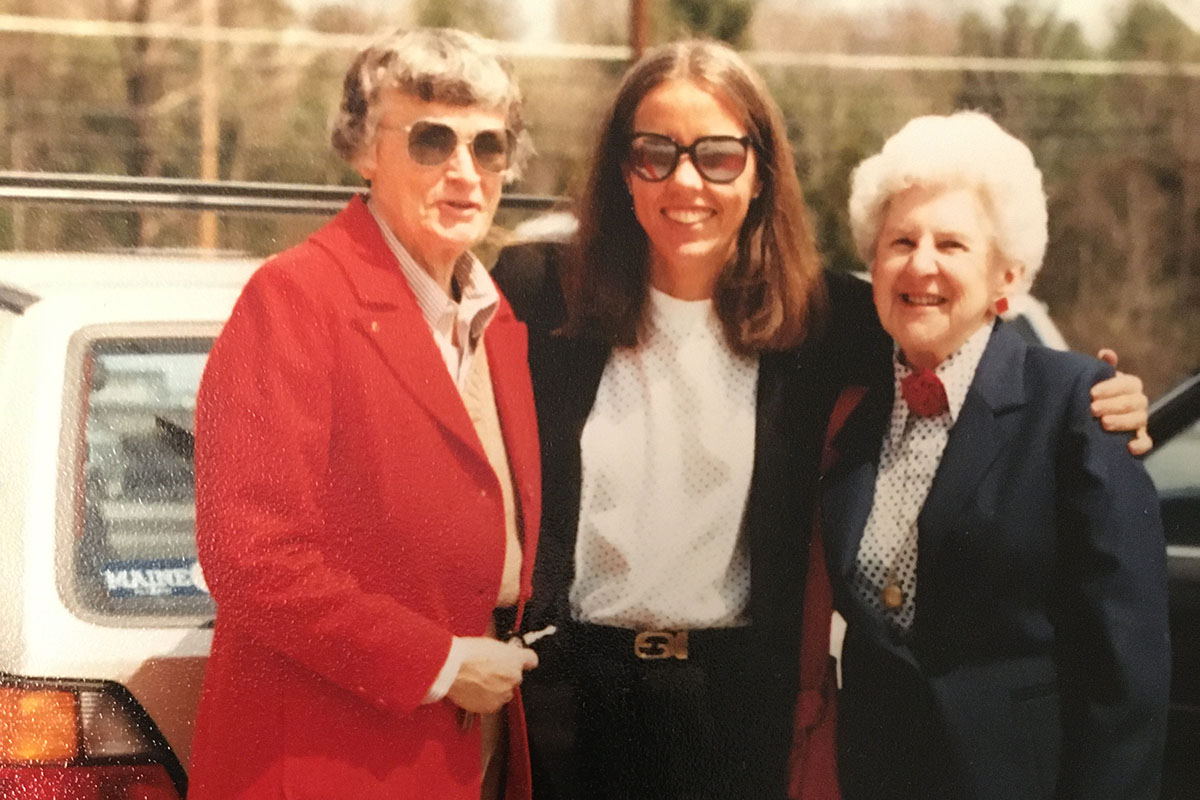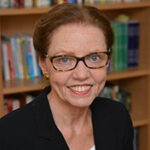
Carole Goldberg: UMaine grad reflects on long career in education, retail, and sexual harassment and assault response services
Growing up in Windham, Maine, Carole Goldberg (‘66) admits she wasn’t the strongest student. Not necessarily a bad student, but not top of her class either.
She was more interested in playing softball, basketball and other sports than she was in school. Fortunately, she had a coach, Marguerite L. “Peg” Ayer (B.S., ‘54; M.Ed. ‘61), who had graduated from the University of Maine and encouraged Goldberg to go there as well, even accompanying her on a trip to campus when she was in high school.
“Peg was instrumental in getting me accepted to the University of Maine,” says Goldberg. “She was familiar with the admissions director, and she said to them, ‘You have to consider this student, she’s smarter than she looks on paper.’ Thank goodness for me!”
Indeed, Goldberg had a distinguished career at Yale University, where she worked for 25 years. She was founding director of the SHARE (Sexual Harassment and Assault Response and Education) Center at Yale and served as assistant clinical professor of psychiatry at the Yale School of Medicine. Before that she traveled the world, first as a teacher and later as a successful retail manager.
But it all started with the decision to attend UMaine on the advice of her coach and lifelong mentor, Ayer.
“She was this amazing signpost in my life at a very critical time,” Goldberg says of her coach, who passed away several years ago.
Goldberg majored in education at UMaine. Ever the athlete, she originally thought she might study physical education, but decided to pursue the more general education degree in hopes that it would lead to broader job prospects. She also participated in activities like theater and the University Singers.
After graduation, she moved across the country to Washington state for her first teaching job in a third-grade classroom on the Tulalip Indian Reservation north of Seattle.
“This was 1966, ’67, and most of the kids came from a pretty impoverished background, some of them had parents in prison,” she recalls. “But they were all terrific, the school was outstanding, and it was a beautiful location with the Olympic mountain chain out your window.”
From there, Goldberg moved to Anniston, Alabama and became part of an effort to integrate schools there.
“Originally, I was to be the one white teacher in an all-black school,” she says. “Then, they were granted some kind of extension on their deadline to integrate, and I was placed in one of their top white schools. Everything was segregated, which was a shocking and significant educational experience for me.”
One day in Alabama, Goldberg saw an ad in TIME magazine for the U.S. Virgin Islands. She wrote to the advertising agency asking for information about teaching there, and someone from the agency wrote back with an address for the department of education in St. Thomas, which became her next stop.
“At that time, about 75 percent of the island’s population were people of color, mostly native Virginian Islanders,” she says. “Now, I was the minority, and this too was an invaluable part of my education.”
After a little while, Goldberg decided she wanted to try teaching in a big city and moved to New York. But right after she did, teachers in the city went on strike. So, she moved back to the Virgin Islands, where her career took a turn. She started working for a family that owned a large retail store in St. Thomas, where she eventually became a merchandising manager for 18 years, sourcing jewelry and watches.
“I traveled all over the world to buy mostly expensive merchandise for the store — Italy, France, Switzerland, Hong Kong. It was fun. It was almost like an upscale toy store for adults,” she says.
Goldberg met her husband, Marty, in St. Thomas and after getting married the couple moved to Florida with his two children. While living in South Florida, Goldberg decided to pursue her dream of going to graduate school, ultimately earning a doctor of psychology degree at Nova Southeastern University in 1996. She ended up being matched with Yale for her pre- and post-doctoral internships, and that’s what led to the final phase of her unique career.

Initially, Yale hired Goldberg as a full-time staff psychologist in its Department of Mental Health and Counseling. Over time, she became the public face of the department, presenting to different groups within the university and advising campus student organizations. While at Yale, Goldberg completed psychoanalytic training to become a certified sex therapist and began training and offering support to student groups, including peer counseling groups. In 2006, recognizing the need for more support resources to respond to sexual assault and sexual harassment on campus, the university established the SHARE Center with Goldberg as its inaugural director.
“At first, it was just me and a phone,” she says. “I maybe had 30 people contact me that year.”
Over time, the Center started offering more programming, including orientations for students, faculty and staff. The Center eventually became its own independent department with round-the-clock counselors and services. By the time she retired in 2019, SHARE had four full- and one part-time mental health professionals on staff, seeing hundreds of people each year.
The #MeToo movement and other cultural changes have raised awareness about sexual assault and harassment in recent years, which Goldberg says has been really helpful to her work.
“It’s given people a vocabulary for their experiences,” she says. “To be able to say, ‘This is not OK, I did not agree to that, this put me in an uncomfortable position,’ whatever it might be, has been very liberating. Having a place where students could seek knowledgeable support and understanding made a remarkable difference for many.”
Even in retirement, Goldberg continues to see clients in private practice, although she has stopped doing in-person sessions since the COVID-19 pandemic began and says that likely will continue. In fact, she recently terminated the lease she had for her private practice and packed up the office. She and her husband split time between Connecticut and St. Thomas, where he still has a business, with frequent trips to Florida where they have family.
Reflecting on how her adult life began, following in the footsteps of her coach and mentor at the University of Maine, Goldberg advises college students these days to be open to anything and everything.
“Use your education to continue to be educated,” she says.
Contact: Casey Kelly, casey.kelly@maine.edu.
